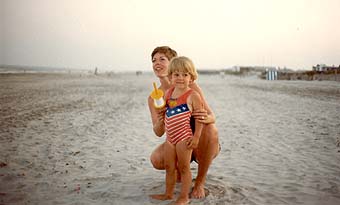 | |
| { The First Post-Menopausal Child Born into the World was Named Isaac, Which Means, in Hebrew, 'to Laugh'. } Jennifer Meccariello
The April 15, 2002 edition of Time broke this news to a cadre of thriving, strong, and hopeful group of women that, were we all still swinging in the sixties, would have been called Career Gals. Reported in the journal Human Reproduction, a study of 782 European couples' fertility (or lack thereof) showed that, generally, a specific slow-down and eventual drop-off of a women's reproductive heyday starts at twenty-seven—not at thirty-three, as the medical world had originally thought. The study coincided perfectly with the publishing of a new book, Creating Life: Professional Women and the Quest for Children by Sylvia Ann Hewlett. Creating Life originally started as a celebration of successful women in their 50s; when Hewlett started her research, however, she found that the one tie that seemed to bind most of her subjects together was a profound sense of loss at never having born a child. Regardless of what we should and should not know about our bodies, the most shocking and nonsensical aspect of these publications is the distinct lack of twentysomethings interviewed, consulted, or even mentioned as an intrinsic piece to this fertility puzzle. They say you start losing your ability to conceive, carry, and deliver a baby naturally and healthfully at twenty-seven. So where are the women and men whom this is going to affect the most in all this research? Lost behind a convoluted feminist/anti-feminist agenda and sensationalistic journalism? Regardless of sexuality or gender, it still takes a man and a woman to make a baby. Still, is this piece of news really a valid debate, or even conversation, when gay men and women can and do parent adopted and natural children? Is this a failure of second-wave feminism, where our mothers were taught they could have their careers and eat their babies, too (so to speak)? Or is it just common sense being truncated and exploited in our media? There is little sympathy from a twenty-five year old woman for a forty-year-old woman who's just finding that her body, so fertile ten years ago, is half-filled with chromosomally abnormal eggs. That twenty-five-year-old woman is trying to find what's out there in life that makes her happy. There's also very little exploration from the latter about how, in fifteen years, she, too, will have this problem. | |
 From early on, we knew the limitations of our bodies—all the way back to the writings of Genesis, Abraham and Sarah knew their luck had run out. Sarah was an infertile woman. Bone dry. But then she begat her little, bouncing baby Isaac, and well, a new term was coined: The Miracle Baby.
From early on, we knew the limitations of our bodies—all the way back to the writings of Genesis, Abraham and Sarah knew their luck had run out. Sarah was an infertile woman. Bone dry. But then she begat her little, bouncing baby Isaac, and well, a new term was coined: The Miracle Baby.